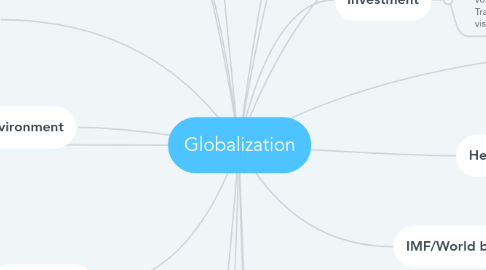Globalization
by Stine Korné

1. Education
1.1. Globalization has created the need for global citizens that have a keen awareness of the political, economic, social, and environmental concerns of our time. Our inter-connected world demands that we not only understand our country, but also have knowledge of nations, cultures, languages, and religions around the globe.
2. Energy
2.1. Energy usage has been such a basic element of human advancement for so long that it is perhaps not surprising it has acquired mounting significance in the era of globalization.
3. Environment
3.1. Green space and energy
4. Human right
4.1. Revolutionary innovations in technology and telecommunications have empowered the individual, for better or worse, to exercise a previously unthinkable degree of self-expression
5. Internatiol law
5.1. A vast network of international law and dozens of international organizations make globalization possible. Treaties and other types of agreements among countries set rules for international trade and finance
6. Media
6.1. From speech to Internet videoconferencing, humans have always found ways to communicate. Nowadays, the media—a catchall term that encompasses the various ways in which entities communicate with others—isn’t just a convenience, it’s practically a necessity.
7. Women
7.1. The current wave of globalization has greatly improved the lives of women worldwide, particularly the lives of women in the developing world.
8. Technology
8.1. In nearly every corner of the world, from Mumbai to Madrid, one cannot enter a café or walk down the street without seeing someone talking, texting, or surfing the Internet on their cell phones, laptops or tablet PCs.
9. Globalization is an expression of exchanges of information and culture through increased tourism, increased trade (import / export) and improved communication.
10. Culture
10.1. For many people, their own cultural values are too important to put a price tag on, and no destruction can be considered “creative.”
11. Development
11.1. The term “development” in international parlance therefore encompasses the need and the means by which to provide better lives for people in poor countries. It includes not only economic growth, although that is crucial, but also human development—providing for health, nutrition, education, and a clean environment.
12. Health
12.1. Four diseases in particular have become extremely important concerns throughout the world. Two of these diseases, HIV/AIDS and tuberculosis (TB), are found across the globe; the other two, cholera and malaria, primarily afflict poorer countries.
13. IMF/World bank
13.1. Toward the end of the Second World War, in July 1944, representatives of the United States, Great Britain, France, Russia, and 40 other countries met at Bretton Woods, a resort in New Hampshire, to lay the foundation for the post-war international financial order.
14. Investment
14.1. When people think about globalization, they often first think of the increasing volume of trade in goods and services. Trade flows are indeed one of the most visible aspects of globalization.
15. Migration
15.1. Transnational flows of goods and capital have driven globalization during recent years. These flows have been made possible by the gradual lowering of barriers to trade and investment across national borders,
16. Trade
16.1. The tremendous growth of international trade over the past several decades has been both a primary cause and effect of globalization.
17. Globalization has an impact on unbelievably many factors but has particular influence on the following points, such as policy, economy, trade and work, and art and culture
18. International integration between countries and other national and international players


